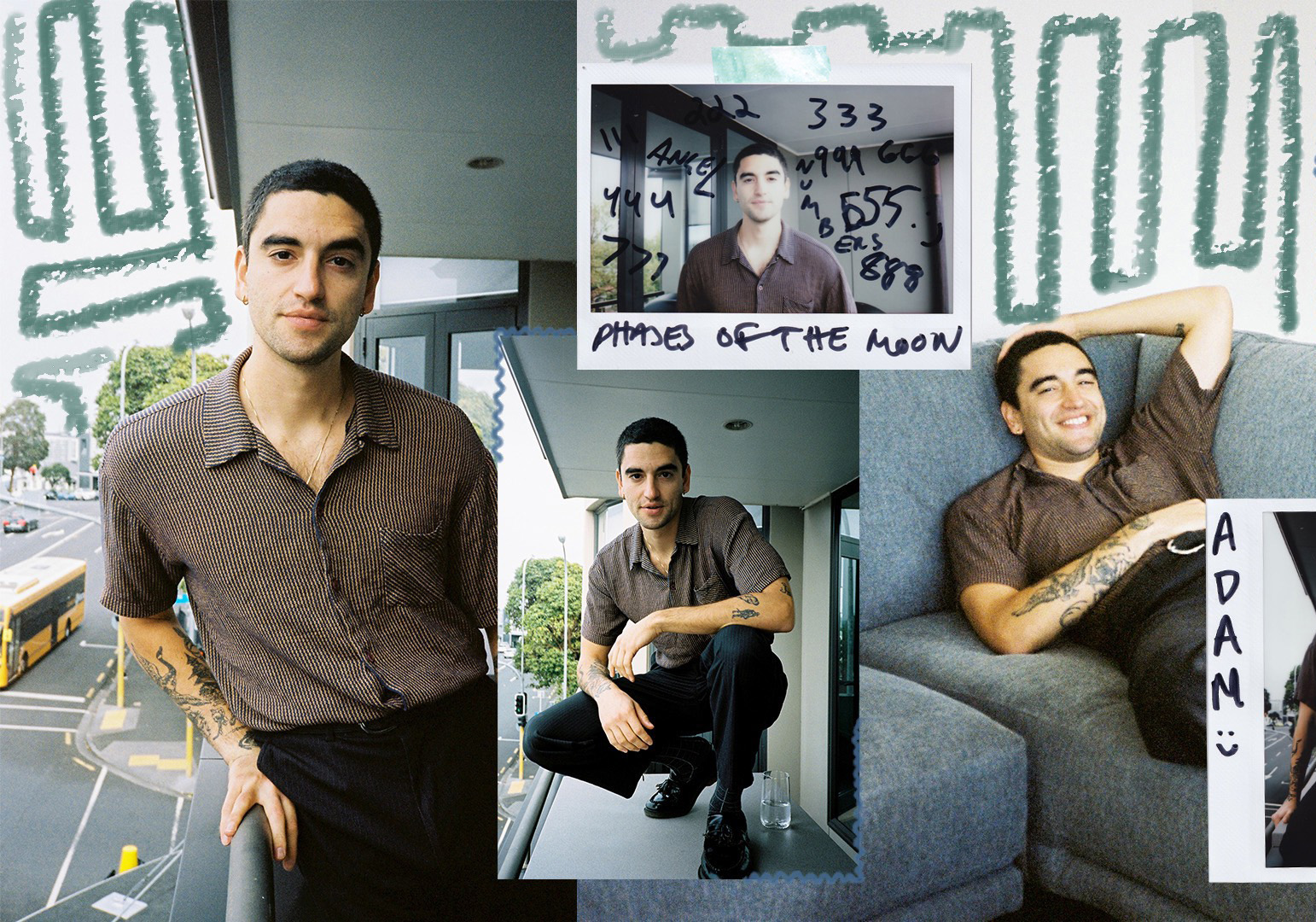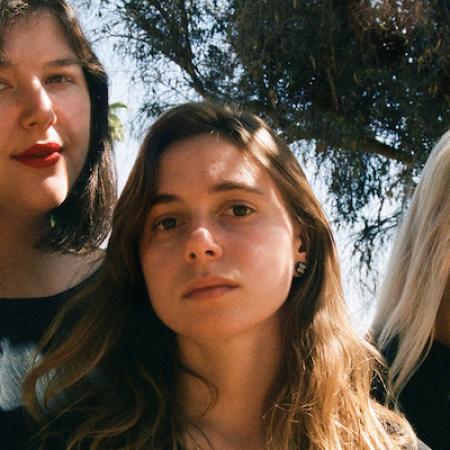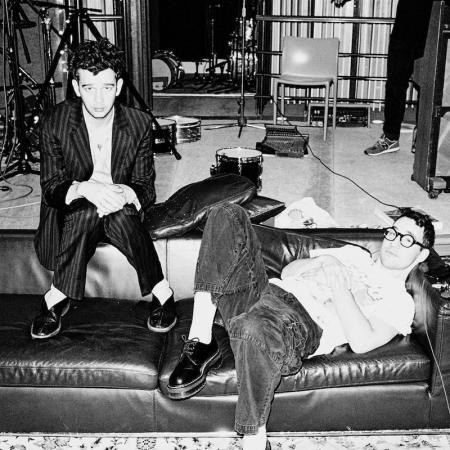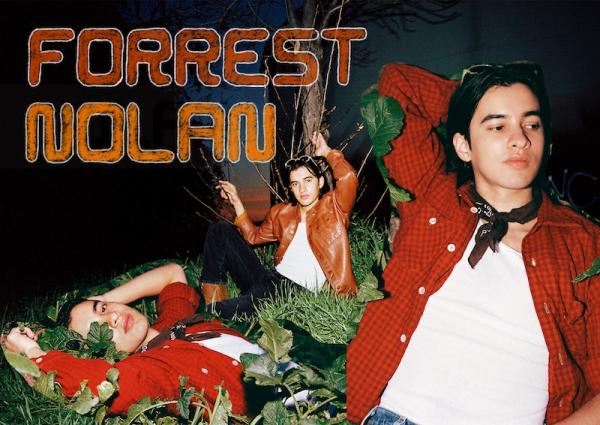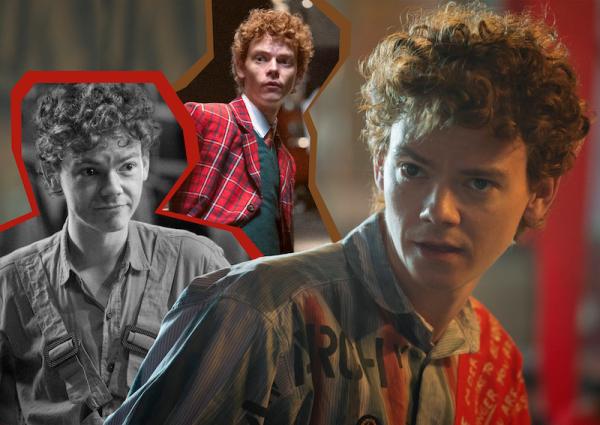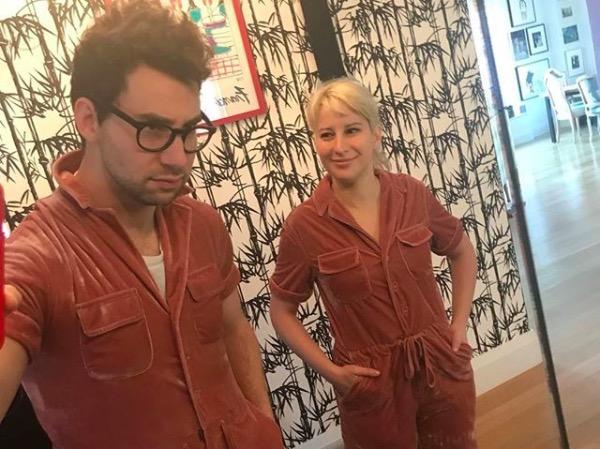Adam Melchor is sitting in his grandma's New York apartment on the eve of the release of his debut album, 'Here Goes Nothing!' I can hear echoes of her playing piano faintly in the background of the Zoom call, and it feels almost too perfectly timed as Melchor tells me fondly about a voice memo of them playing music together, which appears on the album's closing track, 'Sorry Adam'. It's one of the album's standout tracks, where Melchor's poignant self-reflection is undeniable.
The album, in which Melchor candidly chronicles the ups and downs of a long-distance relationship, feels much like opening a page of a diary - one where the writer is unpacking and processing their emotional journey, and you can't help but root for them to get through it.
In conversation, Melchor is equally as thoughtful when discussing the album, whether acknowledging the rawness he was feeling when writing the body of work ("a lot of it is the feeling of when the knife goes in, and then the seconds afterwards"), or speaking forthrightly about the sheer indescribable nature of love ("I just want to be around this person, and I have no idea really why").
We spoke with Adam about his album release, falling both in and out of love, the importance of 'La La Land', and much more...
COUP DE MAIN: I love the lyric in 'I'm Afraid I Love You' where you say: "I'm cliff jumping without a parachute." It captures the terrifying nature of love so well. It reminds me of this poem I read recently: "Falling for someone feels like being a surgery patient, about to undergo an operation, only the doctor is drunk, and never went to medical school."
ADAM MELCHOR: <laughs> They have similar energy! Sometimes you just have to go for it. I especially am really afraid of heights. So any sort of jumping off anything, whether it's a high dive or a cliff jump, that's what it sort of feels like. I think there's a very thin line between anxiety and excitement, and all of it is happening when you feel like you're falling in love. But yeah, getting surgery... You know, it's funny, the first time I ever got stitches was by a drunk nurse at a campground. It has to be my first memory - I remember being four years old and just waking up and all these people are over me. These kids were throwing rocks at each other at the park, and one of them hit me in the head, and it was gashed open. My mom was at a campground with another person who claimed that they were a nurse, but they were just drinking a lot. They put a bunch of stitches in my head. So I'm living your poetry book's journey.
CDM: What do you think it is about falling for someone and falling in love, that's so terrifying?
ADAM: I think the one thing is the indescribable feeling of like, 'Oh, I just want to be around this person, and I have no idea really why.' When you're around your friends, you can pinpoint these things. And like, 'I like this food because of how it tastes, and I like this book because of this,' but there's just something so intangible about it, feeling-wise - it's something you can't explain. Then the other thing too, is I feel like comparing it, being like, 'Oh, is this it? Like, is this how it's supposed to be?' There are these cosmic guidelines that you just have no idea if you're even following the right things or the right path. I think that realising that everybody's journey is so individual is tough because you want something to relate back to you. I think that's why we find it so much in poems or songs or something, that gives us that indescribable feeling. Those are the things that relate to it the most and the only things we have to base off of it. I think because it's so undefined. It's hard to know: what is an act of love? What is this feeling? I think that's what relates mostly to the excitement/anxiety of it.

CDM: What was it about the phrase 'Here Goes Nothing' in that song that made it become the album's title?
ADAM: It's basically just the PG way of saying 'fuck it'. There were so many times where being in a long-distance thing, we would just be talking about it, and being like, 'Should we do this? Should we do that?' And then it was just like, 'Fuck it, I'll see you at the airport in two weeks.' To me, it just really encapsulated the feeling of being in love, where you just have no idea what's going on. But the journey from the cliff to the water is just as important as the water hopefully not being too shallow.
CDM: Have you been playing any of the new album songs live on tour right now? What's it been like, seeing the reaction on stage to the new songs?
ADAM: It's been pretty amazing. I pride myself on a well-written song, but I really pride myself on banter and storytelling before the song. So, before a lot of the new ones, I'll tell this elaborate story, that's usually three times the length of the song. One of these days, I'll just slowly not have the song even be played, it'll just be a comedy set. There are two songs in particular that I talk about a lot, 'Touch and Go' and 'Let Me Know When' and it's really cool because during 'Let Me Know When', there's this thing where I finish the chorus, people start clapping, and it's really nice. It's like these old folk videos or something when it's Bob Dylan playing a song that everyone knows and people just start clapping right away. It's really special. It's sort of this cool thing, because I think as you tell the story, people listen to the lyrics more, and they gravitate towards it, even if they can't really hear what you're saying, they can at least have an emotion that they can apply to it. So that song and 'Touch and Go' have been the highlights of the set so far.
CDM: In 'Angel Numbers' you talk a lot about the 'signs' that people see to convince themselves of things. Why do you think people need 'signs' or something to believe in, to convince themselves of certain things?
ADAM: I think that there are so many times where you're so unsure of yourself, and like one little... whether it's a trinket or some sort of sign, or you almost get hit by a car and it just wakes you up. A lot of times when you're looking at love and you're just like, 'Should I do this, should I not?', then those signs really become the catalyst for those things. It's like 'Inception', where they had the things that were reminders of reality. I think that there are a lot of things that especially in love, it's so hard to describe anything with it. Whenever someone's like, 'Why do you love this person?', I can only merely describe an experience in such a small way. But I think that the more you read about things, and during the pandemic, I was just reading about anything - so it was angel numbers, phases of the moon, and especially in long-distance things, you have to latch onto these smaller things because you don't get as much time in the physical world, so you have to fall in love and keep falling in love over FaceTime and seeing things and sending things to each other. So it's these little mementos that sort of bring you through that.

CDM: I have friends who always see completely random, mundane things and are like, 'This reminds me of this person.' It's always just random stuff.
ADAM: I know! Obviously, the whole album is about this, and I'm still going through it. The reason I made it the way I did is I wanted it to be a revolving door because no love story, at least to me, ever ends. It only takes one person to say, 'Hi.' Then all of a sudden you're back on an airplane. Right now I have a whole list of things on my phone, instead of texting the person, 'Hey, this reminds me of you,' I just have a whole list of things that whenever I see it, I just write it down, as just an exercise to get it out. The list is getting very, very long. It's a really strange thing because you know how to access those moments that will bring you back to a person. I don't know if it's exactly healthy or not, but I think that there's something great about a little toxicity in love. Even today I was walking in New York with my sister. There's a picture of me and the person that this album is about, tucked in the back corner of Rough Trade on the wall, from the photo booth. It really does feel like a movie, sometimes, but you want to experience it. Those moments are the reasons that it's worth living life - they're real feelings.
CDM: What song on the album was the quickest to finish? And which was the longest process?
ADAM: The fastest one to finish, in terms of writing start to end was 'Turnham Green'. We recorded it the day after I wrote it with my friend Emily [Warren]. At the time, I had about six songs or so. It was January and I went through this trying time with the person that song is about. I think it was just so present that I was like, 'If we don't record it now, I just never know if it'll get the right feeling', so that was the shortest one. The longest one was definitely 'I'm Ready'. That song had so many different versions of it, and guitar parts and vocals, lyrics, stuff like that. It's one of the simpler ones, but it took a long time to get to the simplicity of it. I started writing that idea before I was even in this relationship. Then afterwards, I was able to finish it, while I was in it. Sometimes you just need a little bit of perspective over the years, but it's not some Leonard Cohen 'I worked on this verse for 11 years, in a hotel in New York,' but sometimes it feels that way.
CDM: In 'Turnham Green' you contemplate living in another person's life, and making hard decisions. When you're making a hard decision, what do you do?
ADAM: A pros and cons list is great. It always winds up being an argument with myself, it's like being the lawyer for both sides, so it's a little bit tough in that case. I'll try to talk to people who are really close to it. But sometimes just talking to somebody who's not that close with it, and they're just like, 'Oh, yeah, why don't you just do this?' And you're like, 'That would have saved me six months.' So I do think talking to people about everything is always a good idea. Whether that is a therapist or just your roommate, while it's fresh in your brain, it can really help. But definitely writing things down. You learn so much by just putting paper to pen. I wish I did it more. I'm very impulsive, where I'll wake up and be like, 'I need to change all of this. I need to move across the country.' But writing it down sort of grounds it in a way.

CDM: In 'Rest Of My Night' you sing, "Why am I scared of the people who love me when it’s me who pushed them aside?" which sounds like a very avoidantly-attached thing to do. Why do you think that people tend to shut themselves off when things get hard?
ADAM: For me, at least, it's twofold. It's a fear of rejection, and it's also a fear of burdening somebody with it. The people who really love you will never reject you and are happy to take on the burden. The people who really love you will almost be insulted by you not being that open with them. I think that part of love and being in a relationship that I have a really hard time with is, I'm very giving in that sense, but I'm not very good at taking and receiving love in a way. Whether that's because I don't think I deserve it, or I just feel very self-motivated to do it on my own or something... I think with careers, it's good to be self-starting and whatnot, but when you're in a relationship, it's not a matter of I or you, it's a matter of us and we. If you are doing something on your own, you're not giving the other person the right system to work with, and they're making decisions based on another place of fear, that you're pushing them away. I think by being afraid of that, I'm the one who pushes myself away, because it's what I have control over. That to me, is very much an abandonment attachment style, that's plagued me throughout my relationships in the past. I think at the time of that song, I was invited to a party. My roommate and his friend were going to go, and they were leaving the house as I was getting back from a session. I was just so emotional and tired of everything, and they were like, 'Do you want to come?' And I was like, 'No, I think I'm okay.' I just sat there and I was on my phone, and I was like, 'Why am I not going out? Why am I just drinking by myself when I could have been out of this place in my brain?' So that's sort of where I wrote that song from, where it's like, these people want you to be there, I think that sharing these experiences is really great with people. But if you don't let them in, there's no way to let it out. So that's sort of what that song encapsulates for me.
CDM: I love the horn at the beginning of that song! It does remind me of 'La La Land'.
ADAM: First off, I have to give a big shout-out to my friend Noah, who played the trumpet on that very last minute - because that song is actually just a voice memo in the car. Henry and I were working on this song for a long time, and we couldn't find the right way to do it because I would sound so much better just singing and playing it live. So he was like, 'Let's take a drive.' So me, him, and his dog Gus, we all went to this park by his house. I recorded a couple of takes and we used one of those and then I was like, 'Man, I just want this sad trumpet sound.' So we sent it to a friend and Henry put it all together. My biggest influence on this album was the last 10 minutes of 'La La Land' - it's so sad, and it's so hopeful! To me, it's like those angel numbers things where you see one thing and you imagine your whole life with somebody, and the fact that you can even imagine that means it could have been a portal into that world, but you might be better off without them, they might be better off without you. They might find someone better down the line and be happy. Once I saw that film I was like, 'Man, I would love to make something that sounded like this.' So to me, the whole album is sort of like the last 10 minutes of 'La La Land' on repeat.
CDM: In 'Let Me Know When' you think about falling out of love with someone, which is such a heartbreaking moment on the album. Do you think there's even anything one can do to prepare themselves for heartbreak?
ADAM: It's a funny thing you say that because I was listening to a song last night that was written, it's my friend Madi Diaz, this guy Wrabel, and Jamie Floyd, they're called The Three Of Us. They have this song called 'For Months Now'. Basically, the whole concept of the song is, "I've been leaving you for months now," and it's not just a one-time thing, unless the person you're dating is extremely sporadic, it's not just going to be day and night, there's a whole sort of falling out of love process. A lot of times people will just make the decision months in advance before they even tell you. I think at that time, I was sort of feeling like we were really separating in a way, and one of the many times we were just on and off again. I was like, 'Can you just tell me, just let me know when - so I can at least deal with it now?' There were a lot of times when the person I was with too would be like, 'Look, if it's not a big yes, it's just going to be a no,' like, I need to get over this, I need to let it go, I can't do this back and forth thing. That song encapsulates both of our perspectives. I don't mean to speak for the other person, but a lot of the song also comes from their perspective, because when you're in a relationship with somebody for so long, you wind up feeling different things at different times. So it's as much for me as it is for them. It's weird to write these things and listen back, because the only way they can hear what I have to say now is on Spotify - it's a really strange thing.

CDM: Has your perspective changed since writing any of the songs or do they all still feel like what you want to say?
ADAM: I think that the perspective has changed. I think that there are a lot of times when the feeling of hurt changes. It's not victim-blaming but I think a lot of things was, 'Oh, why did this person do this to me?' Then I had to sort of go back and change the language to be like, 'Why did it happen?' You know, it's not anybody's fault. Then you can be like, 'Well, I said this thing at this time, and maybe it was misconstrued in this way.' The person I was with, we are really good at communicating now. We have always been pretty good at communicating and the things that hurt us the most was when it wasn't all the way there communication-wise. I think that just being honest with yourself, and being honest with the other person... A lot of these songs come from a place of honesty of what I was feeling at the time, but a lot of it is the feeling when the knife goes in, and then the seconds afterwards. Not after you've been stitched up and healed and all that stuff. So you know, we'll see if the next album has those songs, but those songs aren't as exciting.
CDM: What's the sample at the beginning of 'Sorry Adam'?
ADAM: That's me and my grandma playing a song on the piano. When we're bored, we'll just go through songs, she'll play them, and I'll just sing them, just sight-reading. While I was in a long-distance thing, you spend so much energy doing that, it's a lot of FaceTimes, and then with work and trying to be present, there's a lot of people I was icing out, I wouldn't answer their text messages or FaceTimes, because I knew I always had them. So in the song I mention my mom and my dad, and my friend Sam, who is the one who started it. He FaceTimed me and I ignored and I was like, 'Hey, man, I'm writing a song right now.' And then in the next message, I said, 'Sorry, brother,' and as a joke, he's like, 'Oh, I don't know this song 'Sorry, Brother', so as a joke I sent him a little thing I was doing on the piano because I was writing, and he texts me, 'Dude, this is amazing.' So I mentioned everybody except for my grandma, so I thought it was fitting to put her in the voice memo. Also because there's this guy named Van Dyke Parks who did the arrangement for it. He's worked on some Beach Boys stuff, he did the original orchestration for 'Bare Necessities' from 'The Jungle Book'. He's amazing, and he's a family friend of Henry's. So he got this orchestra together. My grandpa was a bass teacher, and he was in the New York Philharmonic for 40 years. So he has students all over the country that have worked with him, who are professionals now. So Van Dyke was like, 'I'm going to put this orchestra together for this song,' and then I got a text message from one of my grandpa's students who I've met and he was like, 'Adam, please tell me that we're doing this Van Dyke thing on Sunday together.' So it was kind of cool because my grandpa's student was the one playing bass on it. I never got to see him play, so it's like he's playing. So I thought it was cool to have my grandma's voice on there too. It was really special.
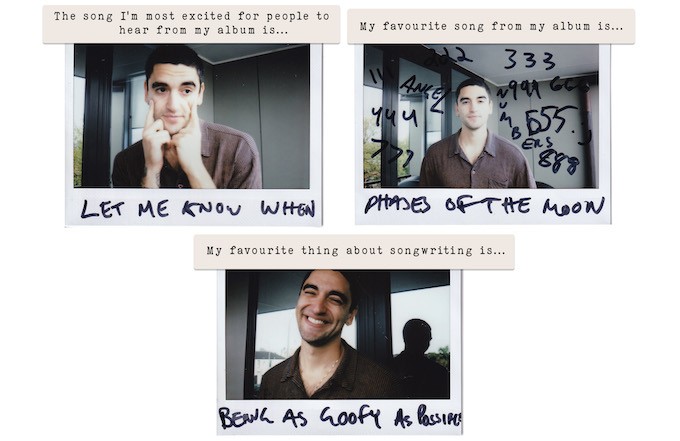
Adam's debut album 'Here Goes Nothing! is out now.
Watch the video for 'Turnham Green' below...


